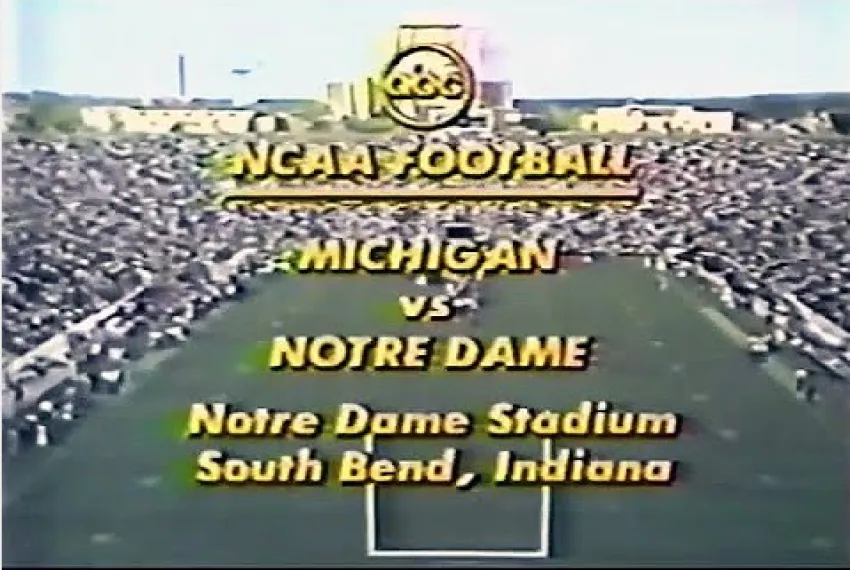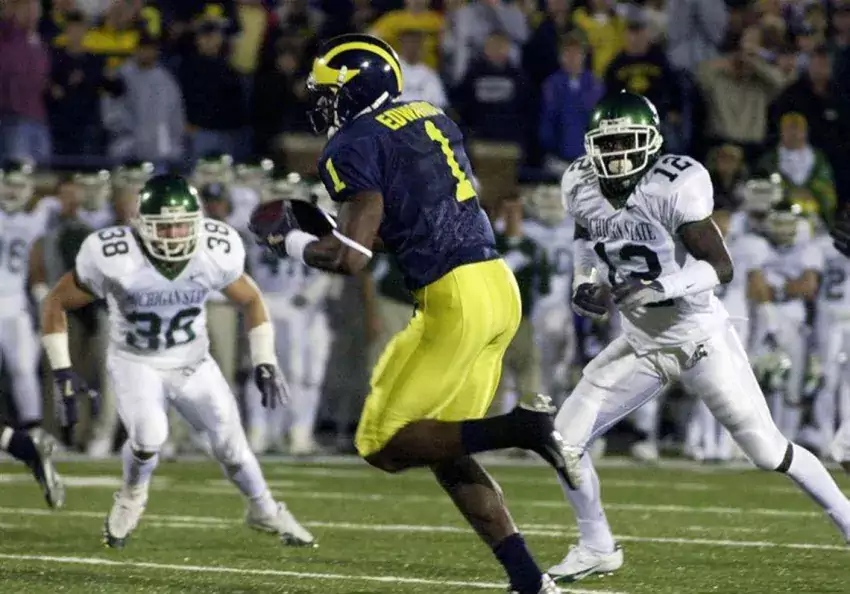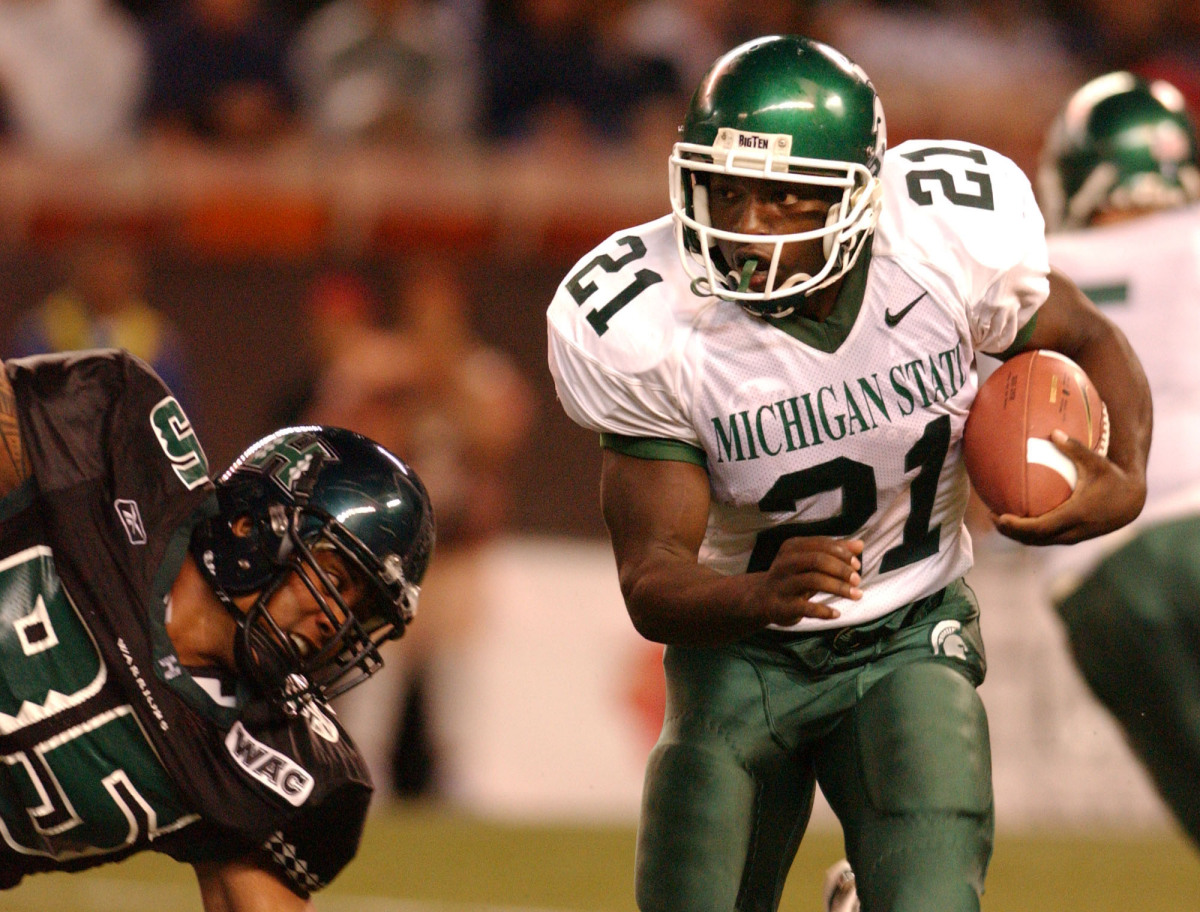MGoRevisited

Previously: 2004 Michigan State, 1992-93 Rose Bowl
We're back to break down another vintage Michigan Football game. This is the third game of the series and today we are jumping back in time another substantial amount to cover the 1978 clash between Michigan and Notre Dame in South Bend. It features a matchup of famed quarterbacks in Joe Montana of Notre Dame and Rick Leach of Michigan and is our first game of both the 1970s and Bo Schembechler's tenure as coach. It's also a significant game for historical purposes, as it was the first edition in the re-started rivalry between the two sides, the first meeting between Michigan and Notre Dame in 35 years. After this 1978 meeting, the Wolverines and Fighting Irish would play nearly every year for four decades before the end of the rivalry in the 2020s.
The team: Michigan came into 1978 on the heels of back-to-back Big Ten Championships, which included wins over Ohio State. The 1976 and 1977 seasons were close to identical, perfect non-conference slates, 7-1 records in conference featuring one random loss but wins over both MSU/OSU, and then a loss in the Rose Bowl (to USC in '76 and to Washington in '77). The 1978 season was to be Rick Leach's senior year, the starting QB entering his fourth season at the helm of Bo Schembechler's option offense. Leach was one piece of the previous year's rushing attack that mostly all returned for '78, starting tailback Harlan Huckleby (743 rushing yards in '77) and fullback Russell Davis (1013 yards), as well as reserve back Roosevelt Smith (308 yards). Both Davis and Huckleby had been All-Big Ten in 1977, as had Leach.
The blockers in front of them had seen some changeover. Just two returning starters rolled over to 1978, the right side of the line featuring Bill Dufek and John Powers, while the remainder of the line had headed off to the draft (LT Mike Kenn had gone on to be picked in the first round, starting an illustrious pro career). Thus, new starters Steve Nauta (C), Greg Bartnick (LG), and John Giesler (LT) were filling in on an offensive line. Due to the new faces, 1978 would be an offensive line that Craig would remember as "pedestrian".
Michigan didn't pass the ball much during this period of the Schembechler era, Leach attempting 147 total passes in 1977 over 12 games (he'd up that to 158 in 1978), but when he did throw he would be targeting returning starters at receiver spots. TE Gene Johnson was back for his senior season, while 1977's leading receiver Ralph Clayton (wingback) was also a senior starter. The 1978 team would give more attention to some relatively new faces, Doug Marsh being a breakout contributor at TE and true freshman tailback Butch Woolfolk seizing a key part of the offense (Lawrence Reid re-emerged to get 50 carries as well). The Wolverines had cobbled together a good offense in '77, but these new contributors and increased experience at the skill positions would take it to another gear, from 17th in scoring offense to 4th in 1978.

[Bentley Historical Library]
On defense, Michigan was still running a 3-4 under DC Bill McCartney (Jack Harbaugh was DBs coach at this time). Along the line, Dale Keitz and Curtis Greer were returning starters at middle guard and shortside tackle, respectively, with Greer becoming the star of the line in 1978. Chris Godfrey rounded out the defensive front, but more stars were found at the ILB/OLB level. Ron Simpkins was a returning starter at ILB and like Greer, he'd raise his game to superstar status in 1978 en route to being an All-American in '79. Bob Hollway, Mark DeSantis, Tom Seabron, and Jerry Meter were part of the group rounding out this position, Meter also earning All-Big Ten honors in 1978.
The defensive backfield featured 1st Team All-Big Ten honoree Mike Jolly and a combination of Mark Braman and Gerald Diggs stepping up to take a starting role at halfback (corner in modern terms). Mike Harden was a fresh-faced starter at free safety and would earn all-conference honors, while the strong safety spot (known as the "wolf" at the time) entered the year with a competition between Stuart Harris and Dan Murray. As a whole, only five starters returned on defense but it wouldn't matter, Michigan finishing with the second-best scoring defense in the country in 1978, allowing only 8.8 points per game against. As Craig remembers the depth chart: "when you just look at the names, the offense was better. But the defense really achieved, except against MSU. Nobody moved the ball but MSU on us". Not bad.
[AFTER THE JUMP: The game]

A couple weeks back I put a post on the MGoBoard about an upcoming series I was planning that would be revisiting great games in Michigan Football history, told by someone who had never seen the game before (me) using insight from someone who had (Craig Ross). This is the first piece in that series and it revisits the most recommended game in the thread I put up... 2004 Michigan State also known as "Braylonfest".
The team: The 2004 Michigan Football season saw a changing of the guard at the two most prominent positions of the era, with the graduations of QB John Navarre and RB Chris Perry in the offseason. In stepped the true freshmen who would define the program over the next four seasons, Chad Henne and Mike Hart. Though being a true freshman starting QB is quite difficult, having returning production in the passing game helped Henne. It especially helped to have a superstar to throw to in Braylon Edwards. Coming off an 1100 yard, 1st Team All-B1G season in 2003, Edwards would be the star of the season and of this game. Fellow wideouts Jason Avant and Steve Breaston also returned, as did TE Tim Massaquoi, meaning four of the top five players in receiving yards in 2003 returned for '04 and were at Henne's disposal (Perry was the other).
On the offensive line, starters returned at LT (Adam Stenavich), LG (David Baas), and RG (Matt Lentz). The team graduated All-B1G C Dave Pearson and RT Tony Pape, plugging Mark Bihl into the C spot and RS Fr Jake Long into the RT spot. By the time this game rolled around, Bihl had been injured, with Baas sliding to center and Rueben Riley taking over LG. Kevin Dudley returned as fullback for his senior season, while David Underwood and Jerome Jackson returned to the 2004 squad at RB, though Hart got the vast majority of the carries (Max Martin was on the depth chart as a freshman as well in '04).

[Bentley Historical Library]
The defensive side of the ball was led by star corner Marlin Jackson, the team's lone defensive All-American (1st team). Opposite him at corner was Markus Curry to start the season, eventually supplanted by sophomore Leon Hall. The safeties were a duo of Ryan Mundy at FS and Ernest Shazor at SS, the latter a hero the week before this game. Scott McClintock manned the middle at MIKE LB, while Lawrence Reid was the starter at WILL. Neither LB earned postseason honors and this game will provide a decent window into why.
Along the defensive line, the gargantuan (6'8") Pat Massey and Gabe Watson, a fellow junior, started for the Wolverines. Watson earned 1st/2nd Team All-B1G for his work that season and they were joined by sophomore OLB/EDGE LaMarr Woodley, who earned 2nd Team All-B1G. Rotational pieces down along the defensive line included Larry Harrison and Alex Ofili, among others. At special teams, Garrett Rivas was a sophomore at kicker (his second season of starting duty), while Adam Finley was a senior at punter, his third and final year as the starter. Steve Breaston handled returns for the Wolverines.

[Ronan Silberman/AP]
The opponent: Michigan State was in year #2 of the John L. Smith era in 2004. They had gone 8-5 the previous season, ending the year with a loss to Nebraska in the Alamo Bowl. Multi-year starter at QB Jeff Smoker had graduated, with Drew Stanton taking over command of the offense in '04. He was given reasonable stability at the skill positions but a defense that would take a sizable step backwards in 2004 relative to the prior year. The Spartans went 1-2 in non-conference to start the season, with losses at home to Notre Dame and at Rutgers, but strung together strong results to open the B1G slate. They knocked off Indiana, lost at Kinnick to Iowa, but then defeated Illinois and ranked Minnesota at home to situate themselves at 3-1 in the conference heading into the bye week, prior to this game (4-3 overall).
[AFTER THE JUMP: The game and my takes on it]
48